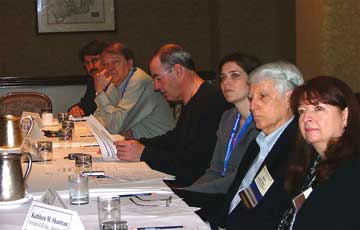Multiple sessions during the IAMC Professional Forum in Charleston stood out not only for the direct discussion they offered, but
the promise of more interaction and education to come.
Roundtable Rounds
Up Security Issues
IAMC's
fifth Research Roundtable, sponsored by DADCO Consulting, focused
on real estate's role in business continuity planning for terrorism
and other security-related incidents. The program was moderated
by Wayne Young of Sprint. Security experts Mitch Albinski of
Pfizer, Inc., Global Research and Development, and Pete Hayse
of Frito Lay North America briefed the attendees on the status
of security efforts at their companies and industry in general.
 |
| A full lineup of corporate real estate practitioners attended the Research Roundtable to close out the Professional Forum in Charleston. |
Hayes noted that food industry security
is interconnected so that a compromise at one company causes
consumer concerns regarding every other company in the industry.
Albinski oversees security programs to protect physical assets,
people, intellectual property, information and the company's
reputation. He said Pfizer must be vigilant against animal rights
advocates, anti-globalization protesters, competitors, criminals,
disgruntled employees and terrorists.
Although physical security happens in real
estate, many have found that the two functions sometimes don't
have much dialogue at the management level. Albinski noted that
security and CRE need to collaborate early in site development
to create security that benefits rather than impedes business.
Good security begins with facility site
selection. Many attendees reported using the "CAP Index" (www.cap
index.com) to evaluate local crime levels and to anticipate
how these might change. According to its Web site, "By combining
surrounding social characteristics, survey information and other
databases with known indicators of crime, CAP data provides
precise scores indicating a site's risk of crime in comparison
to national, state and county averages."
Peer-to-Peer
Furthers the Conversation
Corporate
end users gathered on Monday afternoon in Charleston for peer-to-peer
discussions on the topic of managing a global real estate portfolio.
From Sarbanes-Oxley compliance to choosing a lease administration
system, the participants found answers and insights to a wide
range of issues.
Discussion participants found in much in
common, naturally, but they also differ in some important ways,
such as to whom they report in their organization. At one table,
one manager indicated he reports to the manufacturing division.
Another reports to the corporate treasurer, another to a vice
president of energy and materials, and still another to the
corporate counsel. In all cases, the managers oversee hundreds
of properties in multiple countries, relying on service providers
to varying degrees to resolve local matters.
Service providers and economic developers
also held peer-to-peer discussions, only their topic was the
impact of the Cuno v. DaimlerChrysler decision on state policy
and dealmaking. The session featured insights from economic
developers, service providers and state officials in Ohio, Michigan,
Tennessee, and Kentucky, all within the Sixth Circuit jurisdiction.
Ohio is looking for tax reform to essentially
render the court decision irrelevant by eliminating the tax
on which the exemption in question was offered. In Tennessee,
said Matt Kisber, Commissioner for the State of Tennessee Department
of Economic and Community Development, while the general consensus
is that the court decision does not invalidate state incentives,
action has been taken to modify certain incentives if the court
were to disagree, by taking steps like modifying the "look-back"
clause from three years to six months.
Site selection consultant Mark Sweeney
noted that Cuno is now raised with every project, introducing
considerable uncertainty into searches, especially over the
"scary" prospect of retroactivity.
Corporate end users and service providers
convened to end the peer-to-peer sessions by addressing the
challenges inherent in formulating and issuing a corporate facility
RFP.
Help is On the Way
The inaugural "Get Some Help!" session
in Charleston, moderated by Rick Little of Weyerhaeuser, offered
a rapid-fire discussion among a high-caliber group of corporate
end users and service providers on 17 questions submitted by
corporate end users."What software do you use?" "In-house or
service providers?" "How is the own-or-lease decision made within
your company?" "How is corporate finance influencing your strategy
for larger facilities?" "Have you seen a drop in service level
when your headquarters facility services are outsourced?" "What
is your perspective on re-zoning of company property for residential
use?"
The questions received direct and thoughtful
answers from company executives at Boeing, Honeywell, GE, Alcoa,
Air Products, Holcim, Merck, Federal Mogul and others.Follow-up
on many of the above topics will ensue in Regions meetings,
conference calls, publications, upcoming Forums and the forthcoming
"IAMC Interactive" area on the association's Web site, at www.iamc.org.
Be part of the conversation.
- Joel Parker, Mark Arend and Adam Bruns


